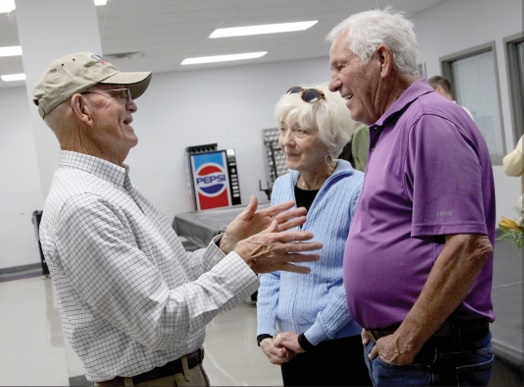Slaughterhouse smorgasbord headed for Barry County
158 permits seek to land-apply on more than 8,400 acres
Two waste-hauling companies have more than 150 proposed permits with the Department of Natural Resources, which if approved, could result in a proliferation of odors similar to land-applied poultry-processing residuals on area land last year.
The DNR invites the public to comment through March 18 on the 158 total permits, which will allow the land-application of industrial processing waste — beef and pork, included — to more than 8,400 acres in Barry County, as well as 778 acres in McDonald County. If enough comments are received, a public hearing may be scheduled.
According to the Missouri Fertilizer Control Board, which previously managed land-application permits, there is no tally of the number of acres on which application occurred in 2023.
Certain effluent limitations, schedules and special conditions will apply to the proposed permits, the DNR’s notice states.
If approved, the proposed permits will be issued for five-year terms.
Two companies are seeking authorization from the DNR to land-apply their processing residuals to Barry County land.
Maryland-based Synagro Central, LLC, a waste disposal company that had a presence in southwest Missouri last year, has applied to the DNR to land-apply poultry-processing residuals to 3,393.5 acres in Barry County and 778 acres in McDonald County. Of Synagro’s 84 permits, 17 are for McDonald County.
A newcomer to the waste-hauling business in Missouri, HydroAg Environmental, LLC, seeks to apply a smorgasbord of slaughterhouse residuals — including beef and pork — to some 5,090.8 acres of Barry County farmland using 74 permits.
The total number of acres in Barry County between both companies is 8,484.3.
According to HydroAg’s business description on the DNR’s proposed permit, the company handles pretreated refuse from “pork, beef and poultry processors, further-processing facilities and facilities that produce beneficial food byproducts.” They have no permits pending for counties other than Barry.
According to Bizpedia, Hydro Ag filed its license to do business in Missouri on Dec. 18, 2023. The same day, Cole County Judge Cotton Walker denied Denali Water Solutions’ request for a temporary restraining order against the Missouri Fertilizer Control Board (MoFCB).
If approved, the restraining order – requested as part of the ongoing Cole County lawsuit, “Denali Water Solutions, et al v. Missouri Fertilizer” — would have forced the MoFCB to reinstate Denali’s and Synagro’s fertilizer permits, thus freeing them from the necessity of acquiring operating permits from the DNR.
Heather Peters, with the Watershed Protection Section of the DNR, says Denali Water Solutions has applied for five permits in Missouri. One application is for its newly constructed storage basin in Randolph County, not yet operational due to an ongoing lawsuit filed by the Citizens of Randolph County Against Pollution (CRAP). The remaining four permit applications, Peters said, are not yet ready for public comment, nor does her department have an anticipated date for a comment period.
Soil and effluent testing schedules for bacteria, nutrients and metals, plus a lengthy list of restrictions, will apply to the land-application of processing residuals in the proposed permits for Synagro and HydroAg.
Vallerie Steele, who lives adjacent to one of Denali’s storage lagoons in Newton County, is not satisfied with the testing requirements.
“No mention is made of required third-party testing of effluent and soil samples,” Steele said. “Heather Peters, with the DNR, told me that would be part of the proposed permit requirements. Without third-party testing, companies can still cherry-pick the test results that they want to submit to the DNR.”
A major difference between the two companies’ proposed permits is that HydroAg’s permit makes mention of storage, whereas Synagro’s specifies land-application.
A full draft of Synagro’s proposed permit can be found at: https://dnr.mo.gov/document/draft-missouri-state-operating-permit-mo0140244-feb-16-2024.
A full draft of Hydro Ag’s permit can be found at: https://dnr.mo.gov/document/draft-missouri-state-operating-permit-mo0140490-feb-16-2024.
The DNR invites the public to submit written comments, via mail or email, on the proposed permit conditions until March 18, 2024.
All comments must contain the proposed permit number: For Synagro: MO-0140244 For HydroAg: MO-0140490. Comments may be mailed to Department of Natural Resources, Water Protection Program, P.O. Box 176, Jefferson City, MO 65102-0176, ATTN: NPDES Operating Permits/Permit Comments. Comments may be emailed to publicnoticenpdes@ dnr.mo.gov.
Comments should be confined to the issues relating to the proposed action and permit(s) and their effects on water quality. The department may not consider as relevant comments or objections to a permit based on issues outside the authority of the Missouri Clean Water Commission, (see Curdt v. Mo. Clean Water Commission, 586 S.W.2d 58 Mo. App. 1979).
All comments must be received or postmarked by 5 p.m. on March 18, 2024.
If the comments indicate a significant amount of public interest, a public meeting or hearing may be held, the DNR proposal states.
Public hearings and/or issuance of the permit will be conducted or processed according to 10 CSR 20-6.020.
Copies of all draft permits and other information, including copies of applicable regulations are available for inspection and copying at the department’s website at https://dnr.mo.gov/ water/what-were-doing/public- notices, or at Department of Natural Resources, Water Protection Program, P.O. Box 176, Jefferson City, MO 651020176, between the hours of 8 a.m. and 5 p.m. on Monday through Friday.
Proposed regulations (partial list)
This permit does not authorize land application:
• Within 300 feet of any potable water supply well not located on the property
• Within 300 feet upstream of streams, lakes, or reservoirs with the designated use of drinking water supply, any public or privately owned well, or other drinking water supply
• Within 100 feet of any classified perennial or intermittent streams or tributaries, public or privately owned ponds or lakes
• Within 300 feet of sinkholes, losing streams, or any other physiographic structure with direct conduit to groundwater
• Within 500 feet of an Outstanding State Resource Water or Outstanding Nation Resource Water
• Within 1,000 feet upstream of streams, lakes, or reservoirs identified as critical habitat for endangered species
• Within 150 feet of an occupied residence, public building, or public use area
• Within 50 feet of the property line, public road, or drainage ditch
• Within the 10-year floodplain Other stipulations include, but are not limited to, the following:
•LandApplicationField(s) Minimum Requirements:
No land application shall occur when the soil or ground is frosted, frozen, snow covered, or saturated. Saturated soil will hold the shape of any object when pressure is applied (ie: boot prints). Daily observation of fields is required. Application activities shall cease if these conditions occur.
There shall be no application during a precipitation event or if a precipitation event of 50% chance is forecasted to occur within 24 hours of a planned application. Additionally, plan accordingly for any forecast for a storm or significant rain event. Runoff is always prohibited.
The applicant shall defer grazing or harvesting of forage crops, in accordance with 10 CSR 20-8.200(6)(E), as follows (these requirements apply to fields under the operational control of the permittee and must be communicated to owners of fields not under operational control of the permittee): (1)May 1 to October 31, the minimum grazing or forage harvest deferment shall be fourteen (14) days from application;(2)November 1 to April 30, the minimum grazing or forage harvest deferment shall be thirty (30) days from application.
Land application fields shall be checked daily during land application for runoff.
Sites utilizing spray irrigation shall monitor for the drifting of spray across property lines. Spray drift is not permissible.
• Application Rate(s) and Loading:
This permit does not authorize application of materials in concentrations known to cause, or having the potential to cause, phytotoxicity in plants per 10 CSR 20-6.015(4)1. If plant stress is observed, the facility may need to reduce application of wastewaters. If phytotoxicity is observed, the facility shall cease land application activities and evaluate the applied substances to determine the cause of phytotoxicity.
Wastewater application shall not exceed one inch (1”) per day, three inches (3”) per week, or twenty-four inches (24”) per year.
Wastewater application on slopes exceeding 10%: The application rate shall not exceed one inch per day (1”/day) In no case shall exceed one-half (1/2) inch per hour.
Sludge, Semi-solids and Solid-laden wastewater application: These materials may be applied to build soil, amend soil, improve drainage, provide nutrients, provide micronutrients, increase oxygenation, provide slow release nutrients, or for substrate for microbes.
Material shall be spread evenly on to the surface.
Dissolved Air Floatation (DAF) skimmings must be knifed in, chiseled in, or tilled in.
Between seeding/ planting and harvest, solids depth can be no more than ¼ inch immediately after land application. At all other times, depth of solids cannot exceed ½ inch immediately after land application.
Applications shall not exceed any agronomic rates listed in the facility description to ensure plant use of nutrients and prevent contamination of surface and groundwater. The agronomic rate is the amount of wastewater applied to a field to meet the fertilization needs of the plants.
Runoff and ponding is prohibited.
This permit does not authorize land disposal or the application of hazardous waste.
The facility must maintain a record of all fertilizer products applied to fields by the permittee; even exempted products, to determine total nutrient loading.




